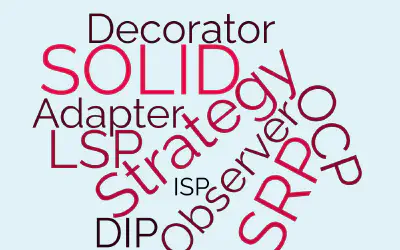SOLID fp

Why SOLID in FP?:
SRP , together with ISP promotes interfaces with fewer methods, and if taken to the extreme, we end up with interfaces with single method. This is not really as extreme as you might be thinking - role interfaces and the functional interfaces (or Single Abstract Method) are exactly this.
What is the difference, then, between an Interface with a single abstract method and a function? Well, it is the state of-course. A function, by definition, doesn’t hold any state. An object that implements a SAM interface, however, will have its own state.
How different are they really? Not much. Closures are all too common in FP. Some languages makes them explicit and some don’t.
In functional programming, the fundamental unit of abstraction is the function. A function has a single input and a single output; functions naturally have a single responsibility. Since functions and closure are fundamental to FP, these principles are not considered something to be done differently.
The OCP is achieved with some form of inheritance mechanism in OOP. Usuaully inheritance with the goal of reuse rather than subtyping (implementation inheritance). Even thought inheritance is commonly used in examples, the core of the principle is about not modifying the existing code but to write new code to extend the feature/behaviour.
Subtyping to achieve openness is from the Bertrand Meyer’s view. Robert C. Martin adopts a ‘openness through polymorphism’ view. Extensibility is supported through substitution rather than modification.
In a functional language, functions can be substituted at will and as such, there is no need to ‘design’ for extensibility. In FP this is achieved by the way of function composition. You also have higher order functions to modify the behaviour. Function composition is, again, fundamental to FP.
LSP is about sub-type polymorphism. An object of inherited class is of parent type because they share the same interface. Since the behaviour can be incompatible with the parent type, LSP asks us to make sure the behaviour too is compatible with the parent type (semantic portability). Subclasses must not strengthen preconditions and must not weaken postconditions.
This is not specific to OOP, this is more of an expectation from polymorphic code. Generic types are common place in both OOP and functional languages. Functional languages favour parametric polymorphism with bounded quantification thereby avoiding some of the pitfalls of inheritance.
DIP is about abstraction. In OOP this means making the members of your class abstract types and injecting the concrete types. Function composition and higher-order functions are the way to go in FP allowing to swap the implementation of concrete details when needed.
So, why SOLID principles are not talked about in FP as much as in OOP? We do talk about the same principles, just that we are always talking about functions, function composition, higher order functions, parametric polymorphism and don’t call them SOLID principles. The principles themselves apply to all softwares; whether one follows OO or functional style.
And here is an old koan to conclude:
The venerable master Qc Na was walking with his student, Anton. Hoping to prompt the master into a discussion, Anton said “Master, I have heard that objects are a very good thing - is this true?” Qc Na looked pityingly at his student and replied, “Foolish pupil - objects are merely a poor man’s closures.”
Chastised, Anton took his leave from his master and returned to his cell, intent on studying closures. He carefully read the entire “Lambda: The Ultimate…” series of papers and its cousins, and implemented a small Scheme interpreter with a closure-based object system. He learned much, and looked forward to informing his master of his progress.
On his next walk with Qc Na, Anton attempted to impress his master by saying “Master, I have diligently studied the matter, and now understand that objects are truly a poor man’s closures.” Qc Na responded by hitting Anton with his stick, saying “When will you learn? Closures are a poor man’s object.” At that moment, Anton became enlightened.



